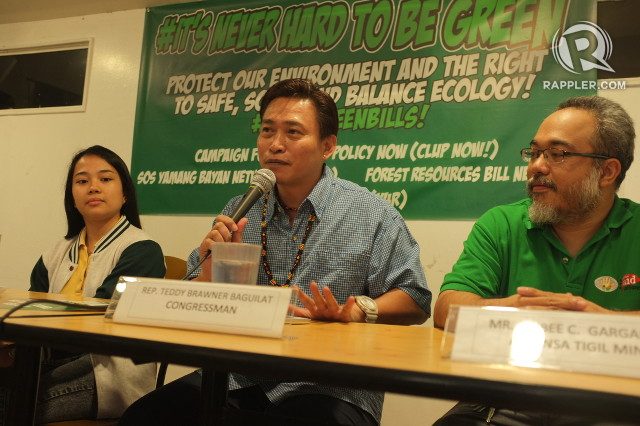SUMMARY
This is AI generated summarization, which may have errors. For context, always refer to the full article.

MANILA, Philippines – With the 2016 elections on the horizon, green groups are making a last ditch effort to get 3 environmental bills passed.
The 3 “green” bills are the National Land Use Bill, Forest Resources Bill, and the Alternative Minerals Management Bill.
“The 3 bills are a call for fundamental change – in mindset, in behavior, in our whole lifestyle,” said Ifugao representative Teddy Baguilat Jr in a press conference on Friday, June 5, World Environment Day.
Baguilat is a sponsor of the bills in the House of Representatives.
Green groups are worried that the building hype over the upcoming elections will further delay the passage of these bills. The National Land Use Bill, for instance, has been languishing in Congress for two decades. President Benigno Aquino III certified it as urgent in 2013.
“By October, the filing of candidacies will be concluded and the informal campaign period will begin. Practically, we have 6 months to renew the push for the 3 green bills,” said Kimberly Alvarez of Campaign for Land Use Policy Now.
Though Congress is currently in the thick of tackling other priority bills like the proposed Bangsamoro Basic Law, sustainable mining advocate Jaybee Garganera said the 3 green bills also deserve attention.
“With a rapidly changing climate, we need clearer policies that will safeguard against impacts of natural disasters. Every day, communities are being harmed by the wrong use of natural resources. These bills are the solution to these problems,” he said.
Baguilat added that the bills will fill in gaping holes in existing environmental laws. Specifically, they will provide certain government agencies with mandate and more funding to effectively safeguard forests, mineral resources, and communities.
What do these bills seek to provide and what are their present status?
1. National Land Use Bill
The Lower House has passed its version of the bill, while Senate version is still being tackled by the Senate Committee on the Environment and Natural Resources chaired by Loren Legarda.
If passed, the bill will mandate the creation of a National Land Use Plan which will determine the proper use of land all over the country. It will harmonize existing but overlapping laws that set aside land for agriculture, forests, protected areas, mining, residential, and commercial development. It will also harmonize maps that identify hazard-prone areas.
Environmentalists regard the National Land Use Bill as a critical foundation for other environmental laws since it will impact greatly on how forests, natural parks, and mining areas are managed.
They say that only through such a bill can the national government properly regulate development and resource protection in a coordinated manner.
But the bill is being opposed by players like the real estate industry, said Baguilat. This is because the bill will prohibit prime agricultural lands from being converted into subdivisions or industrial parks.
2. Forest Resources Bill
This proposed law is still being tackled by Technical Working Groups (TWGs) by both houses of Congress.
The “meat” of the bill is its provision for a logging ban on all primary forests – forests that grew naturally without the aid of reforestation.
At present, Executive Order No 23 issued by President Aquino enforces a similar logging ban. But a law would be more effective since EOs can be repealed by another president, said Baguilat.
“Only around 5% of our country’s primary forest remain intact. Because the situation is so bad, might as well come up with a drastic measure,” he said.
Though the country already has the National Integrated Protected Areas System (NIPAS) Act, the law only covers critical habitats of endangered species. Only Aquino’s EO protects the country’s original forests from logging.
The bill also orders the government to regularly keep tabs on resources these forests can provide in order for them to be managed sustainably.
3. Alternative Minerals Management Bill
This bill, still up for discussions by TWGs, seeks to replace Republic Act 7952 or the Mining Act of 1995.
Garganera and other supporters of the bill say that the current mining regime is too lax in environmental safeguards and unfairly favors mining companies.
Passing the Alternative Minerals Management Bill would ensure stricter environmental regulations and fair distribution of mining revenues, said Garganera.
“If we pass it, we can impose larger tax on mining companies. There will be a more rational collection and distribution of mining revenues.”
The bill also orders the creation of an Industrial Mineral Plan which details how much minerals the government will open up for mining, where mining will be allowed, and the target benefits mining activities should bring to communities.
“It’s not that we don’t want all types of mining. There just needs to be a clear plan in which the Philippines will really benefit,” explained Garganera.
Like logging, the Aquino administration has stopped all issuance of new mining permits until the government finalizes a new mining revenue-sharing scheme.
The logging and mining bans underline the need for the Forestry Resources and Alternative Mineral Management bills, said Baguilat.
The passage of the bills would end the current standstill investors in the logging and mining sectors are now enduring by putting forth a clear national policy that investors can plan for and participate in. – Rappler.com
Add a comment
How does this make you feel?
There are no comments yet. Add your comment to start the conversation.